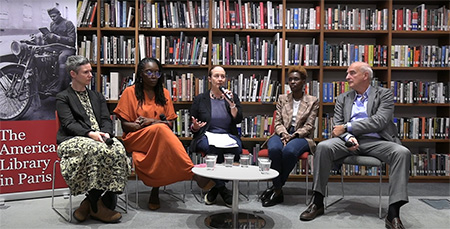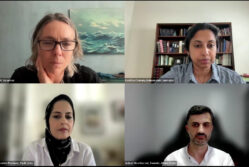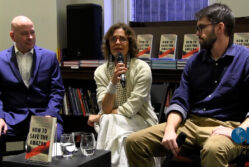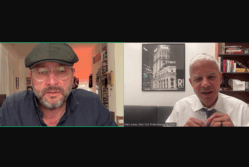Archive Event Highlight

Panelists Discuss Race in France at the American Library in Paris

Left to right: Angelique Chrisafis, Mame-Fatou Niang, Vivienne Walt, Rokhaya Diallo and Roger Cohen.
by Chad Bouchard
On June 27 this year, a French police officer in a suburb of Paris shot and killed Nahel Merzouk, a 17-year-old boy of Moroccan and Algerian descent. The incident sparked protests in Paris and across the country and surfaced persistent wounds of racism, discrimination and police brutality.
A diverse group of four journalists and one academic gathered at the American Library in Paris on Oct. 3 to discuss race in France and place recent events in context.
The moderator for the event, OPC member Vivienne Walt, who serves as Paris correspondent for TIME and FORTUNE magazines, noted in her introduction that it’s particularly difficult to talk about race in France.
“It’s a very prickly subject in this country. That prickliness, in a way, is rooted in a very strong commitment to effectively color-blind policies, not seeing race or even discussing race much,” she said. In light of the police killing and aftermath, Walt added, “the big question is how sustainable these policies are.”
Rokhaya Diallo, a French journalist, author, and filmmaker known for her activism in the fields of racial and sexual equality, said taboos surrounding race hinder work toward positive change.
“Figures show that if you are a young male perceived as Black or Arabic, you are 20 times more likely to be checked by the police than if you are not,” she said. “We pretend to be color blind, but our institutions are not color blind. And, actually, your color can kill you.”
The panelists discussed the French concept of “laïcité,” or secularism, a value of national identity that stems from the French Revolution, originally a reaction against government entanglement with the Catholic Church. In recent years, this idea has been used by French far-right conservatives to justify bans against religious expression in public such as women wearing a Muslim hijab.
Roger Cohen, Paris bureau chief for The New York Times and a past OPC Award winner, agreed that reluctance to discuss race removes tools needed to address inequality.
“The problems are exacerbated by not having the analytical means to understand the situation. Where are the figures on intermarriage? Where are the figures on forms of prejudice? Where are the means to analyze the racism that evidently does exist in French society? It’s frustrating to live in a country which is denying, on many levels, a core problem.”
He added that due to these gaps in awareness, he is not optimistic about the country’s ability to correct its course.
“I don’t think the country is going to change. I think this is a fixed and immovable core of French identity and I don’t see it shifting, certainly not in the near future.
Mame-Fatou Niang, associate professor of French and Francophone Studies at Carnegie Mellon University, rejected the notion that change is not possible.
“The country has changed,” she said. “The country will continue changing. The issue that is that it’s not acknowledging the change.”
Niang, a Black woman who was born and raised in France, is the co-author of a book titled Universalisme that examines the myth that one’s identity as a French citizen transcends race, ethnicity, gender and religion.
“I don’t speak of universalism as a model. I speak of it and I wrote of it as a project,” she said. “What’s the history that brought us into this reality? What we are told we are seeing is against our all our senses – what we are smelling, what we’re tasting what we’re seeing, what we’re hearing — we’re told ‘you’re not seeing this reality.’”
Angelique Chrisafis, the Guardian’s Paris correspondent who has reported from France since 2006, traveled to many areas around the country to report on the protests. She noted a report from the Organization for Economic Co-operation and Development (OECD) indicating that children born and schooled in a low-income neighborhood in France have less chance of escaping their socioeconomic background than in most other developed nations.
“So, time and time again, traveling around the areas where there was unrest, teachers and teenagers were saying that they were being funneled into [vocational] courses at the age of 14 instead of routes that would take them to university,” she said. “And they were being stopped and asked for ID papers outside if they were perceived to be of Black or North African origin, whereas their white friends might not be.”
Chrisafis added that in an ongoing class action by six organizations including Amnesty International and Human Rights Watch against the French state, France’s Council of State earlier this month acknowledged “gross negligence” in discriminatory police stop-and-search checks.
Click the window below to watch a recording of the program.



